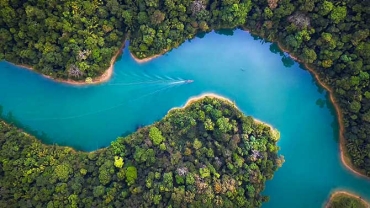
Koos Biesmeijer (Naturalis) on the importance of biodiversity and COP15
The UN summit on biodiversity starts right on time. The earth's natural capital is in decline and thus our first line of life is under pressure. This has implications for all of us, including the future resilience of organizations. In Montreal, Canada, policymakers, politicians and nature experts are discussing the future of biodiversity at COP15.
We asked our network of experts about the expectations and opportunities of this summit, because only together can we make progress. Today: Koos Biesmeijer, professor of Natural Capital at Leiden University, scientific director of the Naturalis Biodiversity Center, bee expert and vice-chairman of Natuurmonumenten.

Koos Biesmeijer: 'A "Paris agreement for biodiversity" is a bit too far off, I'm afraid'
The UN climate summit COP27 has just ended and the results disappointed many. Now the world looks expectantly to COP15. What are your expectations from this UN summit regarding nature?
'I expect countries to negotiate seriously about the goals, but above all I hope clear agreements will be made about how those goals will be met. The EU is negotiating on behalf of all member states and can therefore take a firm position in line with the Green Deal, the EU Biodiversity Strategy and the Nature Restoration Law. All these instruments together also already give the Netherlands a clear direction, urgency and perspective for action.'
The Paris Climate Agreement provided a turning point in the fight against climate change by establishing that the average temperature increase on earth must remain below two degrees Celsius. It is hoped that COP15 will become the so-called ‘Paris for biodiversity’. How realistic do you assess that is?
'A "Paris agreement for biodiversity" is a bit too far off, I'm afraid. Although of course that would be the very best thing. I hope there will be real agreements on how we are going to meet the targets and how much money is needed and available for it.'
The Global Biodiversity Framework has formulated in first draft four long-term targets for 2050 and over 20 sub-targets for 2030. At COP15, these goals will be discussed and negotiated. One of the goals is to prevent or reduce the introduction of invasive exotic species and establishment by at least 50 percent. An exotic species is invasive if it spreads widely and thus becomes a pest. What are your thoughts on this objective?
'Invasive species are a threat in many systems, and sometimes it turns out to be an opportunity. They are spread primarily by human activity. This objective actually says two things. Firstly, we should spread fewer species, but that is virtually impossible because the economy is now a global business. Secondly, that invasive species must be removed, but that is very costly and also difficult.'
'Removing rats or goats from an island is sometimes still possible, but removing crayfish or a one year plant like the Dutch giant balsamia is virtually impossible. We have to learn to live with them. It does seem right to give priority to areas in which very special biodiversity is threatened by exotic species, such as islands.'
Meeting this goal sounds complicated. If this goal is formally established, what does it mean for business? What should companies and factories do when the non-commitment gives way to a real commitment?
'That is quite an issue. Enforcement is then in the hands of the economic party. In practice, this means that with every transport it must be guaranteed that nothing has actually hitchhiked. That is nearly impossible, expensive and therefore not going to happen.'
Hitchhiking exotics, what should we think of?
I am referring to exotic species that come in via ships ballast water or via freight transport, for example. For foreign plants or animals you usually have to be at campsites or in ports, because that's where hitchhikers disembark.'
'If we no longer have nature, the costs will be high and the problems will be major.'
The Convention on Biological Diversity, as mentioned earlier, has formulated several objectives. From your knowledge and expertise, which objective do you think is important to highlight?
'The combination is the most important. These are goals that focus on direct protection and restoration. This means understanding which economic (and other) activities pose the greatest threat for the biodiversity. We must stop subsidizing these activities and, if possible, limit and adapt them.'
'We must combine these restoration goals with the realization that biodiversity is our future. This means we have to make clearer what nature provides us with if we take good care of it and what the high costs and problems are if we no longer have nature.'




















